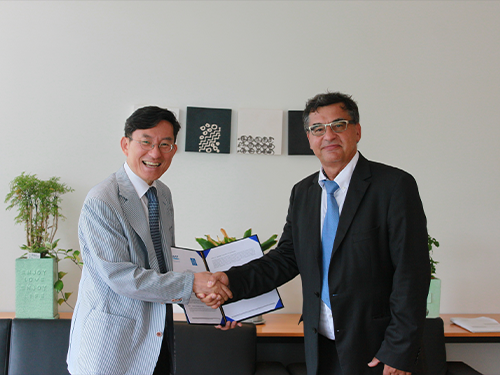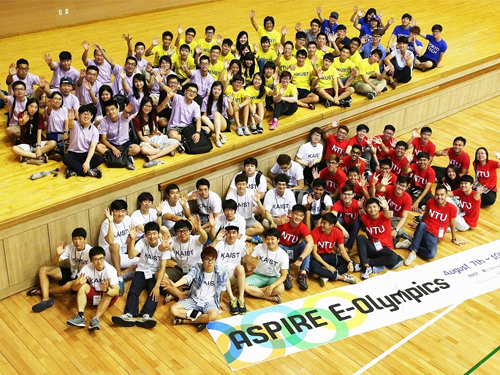student+exchange
-
 KAIST and KTH Establish a Dual Degree Program in Nuclear Engineering
Professor Man-Sung Im, head of the Nuclear and Quantum Engineering Department at KAIST and Director Waclaw Gudowski of the Physics Department at the KTH Royal Institute of Technology in Stockholm (KTH), Sweden, agreed to establish a dual master’s degree program in the field of nuclear and quantum engineering, and signed the agreement on July 4, 2016 at the Faculty Club on the KAIST campus.
Following the first joint degree program in mechanical engineering in 2014, this is the second dual degree program created between the two universities.
Under the agreement, which will be effective beginning in the 2016 fall semester, KAIST and KTH will exchange students, confer students dual degrees when they earn the required number of credits, and support financial aid for exchange students.
Dean Im said, “The two schools have enjoyed an excellent reputation in nuclear and quantum engineering, and offering students more opportunities to study abroad at the other university will produce synergistic effects for the growth of the two schools' education and research.”
Founded in 1827, KTH is regarded one of the most prestigious universities in Northern Europe.
Professor Man-Sung Im of KAIST’s Nuclear and Quantum Engineering (pictured on the left) and Director Waclaw Gudowski of KTH’s Physics Department are shaking hands after signing the agreement for the dual master’s degree program.
2016.07.05 View 9630
KAIST and KTH Establish a Dual Degree Program in Nuclear Engineering
Professor Man-Sung Im, head of the Nuclear and Quantum Engineering Department at KAIST and Director Waclaw Gudowski of the Physics Department at the KTH Royal Institute of Technology in Stockholm (KTH), Sweden, agreed to establish a dual master’s degree program in the field of nuclear and quantum engineering, and signed the agreement on July 4, 2016 at the Faculty Club on the KAIST campus.
Following the first joint degree program in mechanical engineering in 2014, this is the second dual degree program created between the two universities.
Under the agreement, which will be effective beginning in the 2016 fall semester, KAIST and KTH will exchange students, confer students dual degrees when they earn the required number of credits, and support financial aid for exchange students.
Dean Im said, “The two schools have enjoyed an excellent reputation in nuclear and quantum engineering, and offering students more opportunities to study abroad at the other university will produce synergistic effects for the growth of the two schools' education and research.”
Founded in 1827, KTH is regarded one of the most prestigious universities in Northern Europe.
Professor Man-Sung Im of KAIST’s Nuclear and Quantum Engineering (pictured on the left) and Director Waclaw Gudowski of KTH’s Physics Department are shaking hands after signing the agreement for the dual master’s degree program.
2016.07.05 View 9630 -
 ASPIRE League 2014: E-Olympics among Five Asian Universities
About 150 undergraduate students from five leading science and technology (S&T) universities in Asia met at the KAIST campus to attend the E-Olympics on August 7-9, 2014.
The E-Olympics began as a student exchange conference held under the Asian Science and Technology Pioneering Institutes of Research and Education (ASPIRE) League, which offers a variety of events, such as workshops, sports matches, lab visits, special lectures, and art performances, to promote academic and research collaborations and cultural sharing between the students of the league member universities.
Founded in 2009, the ASPIRE League is a university consortium consisted of five top S&T universities in Asia: KAIST in Korea, the Hong Kong University of Science and Technology (HKUST) and Tsinghua University in China, Nanyang Technological University (NTU) in Singapore, and Tokyo Institute of Technology (Tokyo Tech) in Japan. The ASPIRE League aims to provide a knowledge and technology hub for innovation in Asia through the advancement of science and technology and the development of human resources.
Since its start, the ASPIRE League has been holding an annual conference with programs for research collaboration, student exchange, educational cooperation, and satellite laboratories among professors, senior managers, and students of the member universities. This year, however, the consortium decided to dedicate the conference to students by holding the E-Olympics.
Each university sent 30 students to KAIST for the participation of the E-Olympics. For three days, participating students engaged in discussions and presentations at academic workshops; held athletic games including a relay race, basketball, and a rowing race; and toured a few KAIST laboratories, among them: the E-mobility Research Center, the Bio-imaging and Cell Signaling Research Center, the Mechatronics Systems and Control Center, and the Center of Field Robotics for Innovation, Exploration and Defense.
The students also attended a music concert performed by a KAIST student club and a lecture entitled “Entrepreneurship through Global Networking” that emphasized the importance of personnel networking in transferring technological innovation into business opportunities.
Chang-Dong Yoo, the Dean of the International Office at KAIST, said, “The E-Olympics will offer students from top science and technology universities in Asia opportunities to interact with each other on a more personal level. I hope that through many of the E-Olympics programs, the students will learn about each other’s culture and academic strength and develop a sense of community to create a “New Asia” by working together.”
2014.08.11 View 14337
ASPIRE League 2014: E-Olympics among Five Asian Universities
About 150 undergraduate students from five leading science and technology (S&T) universities in Asia met at the KAIST campus to attend the E-Olympics on August 7-9, 2014.
The E-Olympics began as a student exchange conference held under the Asian Science and Technology Pioneering Institutes of Research and Education (ASPIRE) League, which offers a variety of events, such as workshops, sports matches, lab visits, special lectures, and art performances, to promote academic and research collaborations and cultural sharing between the students of the league member universities.
Founded in 2009, the ASPIRE League is a university consortium consisted of five top S&T universities in Asia: KAIST in Korea, the Hong Kong University of Science and Technology (HKUST) and Tsinghua University in China, Nanyang Technological University (NTU) in Singapore, and Tokyo Institute of Technology (Tokyo Tech) in Japan. The ASPIRE League aims to provide a knowledge and technology hub for innovation in Asia through the advancement of science and technology and the development of human resources.
Since its start, the ASPIRE League has been holding an annual conference with programs for research collaboration, student exchange, educational cooperation, and satellite laboratories among professors, senior managers, and students of the member universities. This year, however, the consortium decided to dedicate the conference to students by holding the E-Olympics.
Each university sent 30 students to KAIST for the participation of the E-Olympics. For three days, participating students engaged in discussions and presentations at academic workshops; held athletic games including a relay race, basketball, and a rowing race; and toured a few KAIST laboratories, among them: the E-mobility Research Center, the Bio-imaging and Cell Signaling Research Center, the Mechatronics Systems and Control Center, and the Center of Field Robotics for Innovation, Exploration and Defense.
The students also attended a music concert performed by a KAIST student club and a lecture entitled “Entrepreneurship through Global Networking” that emphasized the importance of personnel networking in transferring technological innovation into business opportunities.
Chang-Dong Yoo, the Dean of the International Office at KAIST, said, “The E-Olympics will offer students from top science and technology universities in Asia opportunities to interact with each other on a more personal level. I hope that through many of the E-Olympics programs, the students will learn about each other’s culture and academic strength and develop a sense of community to create a “New Asia” by working together.”
2014.08.11 View 14337